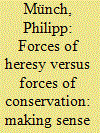| Srl | Item |
| 1 |
ID:
160875


|
|
|
|
|
| Summary/Abstract |
Ethnicity and ideology are frequently used to determine whether an armed group is hostile or friendly vis-à-vis the state. By contrast, I argue that the social structure of insurgent movements holds more explanatory power for their respective positions than ethnicity or ideology. To illustrate this, I apply Pierre Bourdieu’s concept of a contest between forces of ‘conservation’ and forces of ‘heresy’ to the current Afghanistan war. I demonstrate that the social structure of the Taleban renders them prone to ‘heresy’, while the formerly second biggest insurgent group, Gulbuddin Hekmatyar’s party, has rather been an impeded force of ‘conservation.’
|
|
|
|
|
|
|
|
|
|
|
|
|
|
|
|
| 2 |
ID:
161573


|
|
|
|
|
| Summary/Abstract |
The phenomenon of China’s rise has urged some to look for International Relations (IR) theories with ‘Chinese characteristics’. A number of these have been associated with the ‘relational turn’. Yet, attempts to bring the Anglophone and the Sinophone strands of the relational turn have failed to transcend the bifurcating metanarrative of the mainstream. To rectify this trend, the analysis engages the literatures on guanxi, the relational turn, and Chinese IR and develops a normative claim about the underlying relationality of knowledge production in post-Western IR. The contention is: (i) that the criticism of substantialism offered by the Anglophone literature on the relational turn fails to overcome its Eurocentrism; (ii) that by subscribing to the epistemic duality of the West vs. the non-West, the Sinophone literature has aborted the political promise of the concept of guanxi. The study deploys guanxi to amplify the intrinsic relationality both of global life and the realms of IR.
|
|
|
|
|
|
|
|
|
|
|
|
|
|
|
|
| 3 |
ID:
187531


|
|
|
|
|
| Summary/Abstract |
There is a multifaceted relational revolution afoot in International Relations (IR) and in the social sciences more widely. This article suggests, via engagement with varied forms of relational thought and practice in IR, but in particular via engagement with ‘relational cosmology’ associated with the ‘natural’ as well as the ‘social’ sciences, that there are important reasons for relational thought and practice in IR and around it to be more attentive to dialogues on relationality across natural and social sciences. If relational thought in IR has challenged the colonial and bifurcated ontologies of the field, relational cosmology too assists in shifting ‘modern’ understandings of science and the cosmos by facilitating engagement with situated knowledges and deep-going relationalities across ‘nature’ and ‘society’, ‘human’ and ‘non-human’ communities. Relational cosmology may be productive in joining, and perhaps even in facilitating, conversations across multiple relationalities emerging from different parts of the world and in different fields of inquiry, and yet – reflecting its relational and pluriversal orientations – it is not proposed here as a new ‘meta-‘ or ‘grand-’ narrative for relational theorising or IR.
|
|
|
|
|
|
|
|
|
|
|
|
|
|
|
|
| 4 |
ID:
187536


|
|
|
|
|
| Summary/Abstract |
The literature on International Relations theory has yet to align relational theory with role theory, despite the fact that these two theories share so much epistemological common ground. This article uses role theory to bridge the gap between the Confucian and Western conceptions of relationality, whose practitioners regard each other as strangers. With the support of role theory, the comparative analysis of relationality in this article has mainly focused on two different types of relations: prior rule-based relations and improvised relations. The differences in the cultural preparation for these two relations partially explain the plurality of the relational universe and the perception of stranger. Role theory is one way to reconnect the seemingly irreconcilable relational universes. To illustrate the value of a composite agenda of relational theory and role theory, the article will use Kim Jong-un of North Korea as its case. Confucian relations propose that, for all nations, the necessity of having a certain role relation is a more important agenda than insisting on exactly what role to take.
|
|
|
|
|
|
|
|
|
|
|
|
|
|
|
|
| 5 |
ID:
107258


|
|
|